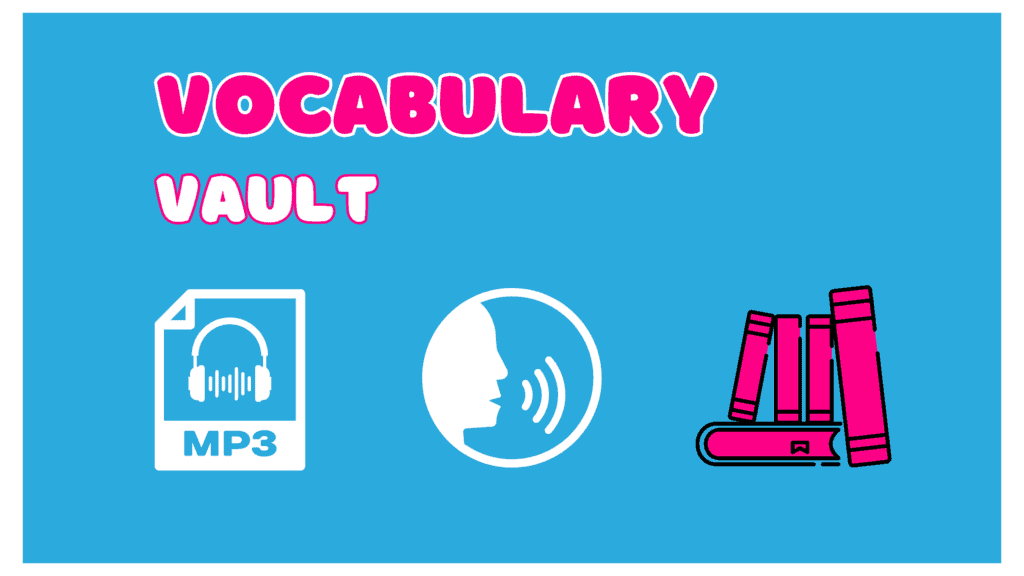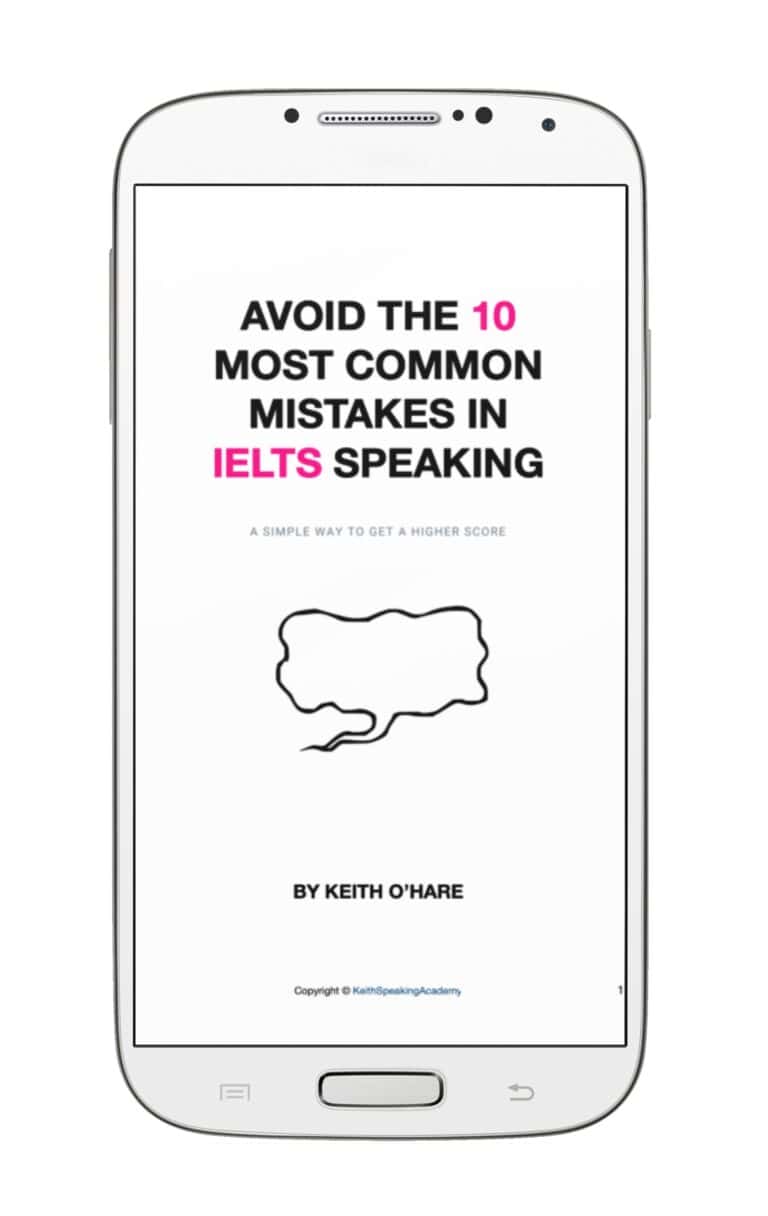IELTS Speaking Lesson about Relaxing
👇 Take this lesson with you! 👇
In IELTS Speaking Relaxing and Free Time are common topics. There are many ways to relax and lots of idiomatic vocabulary you can use to talk about your leisure time.
In this free IELTS Speaking lesson, you will learn the vocabulary you need to talk fluently on this topic.
Table of Contents
Relaxing activities
In the picture below we have some activities that can be relaxing.
Can you guess what they are?
Click arrow to open/close answers
- Going to the gym / hitting the gym / working out at (in) the gym
- Watching (live) sport / movies
- Reading
- Playing games / Doing some exercise / Playing with the family / Going outdoors
- Going on holiday / chilling on the beach
- Doing yoga / doing some meditation / doing pilates

IELTS Speaking vocabulary: Relaxing
When we are not working or studying we can relax, this time can be called:
- Free time
- Leisure time
- Downtime (U.S.)
Useful adjectives for activities:
- Relaxing / calming / soothing
- Rewarding / satisfying
- Therapeutic / healing / soothing
- Enjoyable / pleasurable
Remember, you can make your answers much richer by adding adverbs.
The following adverbs can be used with most adjectives:
- really
- extremely
- incredibly
Click for More Useful Adverbs:
Useful verbs for activities:
We usually use the verb ‘to relax’ on its own. We rarely add ‘myself’ or ‘body’. It is possible, but not very normal.
I can relax when I am at home, away from the stress of work.
I like to relax and go swimming.
Swimming helps me relax.
We might add ‘body and mind’ at the end of a sentence, to emphasise the impact on the body and mind.
I find yoga can help me relax my body and mind
This is how we use the verb in a sentence.
I like to relax with + noun
I like to relax with a book / film / coffee / drink
I like to relax by + ING (gerund)
I like to relax by reading a book
Other verbs we use with a similar meaning are;
I like to kick back ’n’ relax
I like to chill (out)
I like to mellow out
I often unwind
I love to disconnect
I need to destress
IELTS Speaking: Spending your free time
When we talk about free time activities that we do, here are some useful phrases:
To dabble in = to try an activity for fun, not too seriously
I like to dabble in painting
To try your hand at = to try a new activity (usually for the first time)
I would like to try my hand at baking
To take up an activity = to start a new activity (usually a new hobby)
I recently took up golf
To be into something = to enjoy doing something
I am really into photography

IELTS Speaking idioms: Talk about relaxing
To take the weight off your mind = to get rid of a problem
That conversation with you over dinner really took a weight off my mind
To blow off steam – release energy or tension in order to relax (when stressed or angry)
I can blow off steam when I play football on Thursdays.
To loosen up = to relax
I am so tense after that terrible meeting, I need a coffee to loosen up.
To let your hair down = to relax
I am going to let my hair down and go dancing
To release my pent up energy = to release tension
I need to go jogging to release this pent up energy
To put your feet up = to relax
I am going to put my feet up and watch a film
To take it easy = to relax
I like to take it easy by reading a book
To while away the time = to spend time in a relaxed way
I like to while away the afternoon watching Netflix.
Pronunciation Files For Vocabulary From My Best Live Lessons
Use Words EASILY in English Conversations!
More Free IELTS Speaking Lessons
If you liked this lesson, leave a comment below!
There are more lessons you can follow in the links below too.
RECYCLING in IELTS Speaking. Useful collocations and vocabulary to help you discuss about recycling.
TV SERIES in IELTS Speaking. Vocabulary you need to describe different kinds of Television Series.
HOLIDAYS in IELTS Speaking. Discover the 10 things the British do on holiday and learn the useful vocabulary and idioms to talk about it.



In my spare time, after a long tiring day of studying, I’d like to unwind by watching some videos on YouTube like funny videos of pets or sometimes those of sharing kindness in the public.
Sounds good to me!
hi Keith
i wanna ask a thing off the topic that in the idiom “To while away the time = to spend time in a relaxed way” why isn’t it “relaxing way”?
So actually, both adjectives can be used here. ‘Relaxing’ would describe the way you do it, and ‘relaxed’ would describe how you feel as you do it.
Thank you for replying. Looking forward to watching more videos of yours sir
I’m really into watching films in cinema. I usually go to the cinema three or four times a week. After having a tedious work or spending much time for working, before go home, I often look up 21 cineplex on the internet and look for a kind of comedian movie to chill out. More often than not my partner and I go together but once a while I go by my self. I would like to try my hand at golf sport as well. This is first time for me doing this kind of sport and this is fun.
Nice answer – I also think golf would be fun.
when I have a spare time I’m really into playing with my kid.By the same token I’d like to try my hand at making different cuisine especially Chinese and Nepali.
Lovely – look forward to seeing how your new dishes turn out 😁
Whenever I have free time I’d try like to take up a language learning course. Having said that best way of unwinding for me to visit countryside and capture some mesmerising landscape with my camera .I am really into it.
Hlaing War War Tun
I’m soooo into watching musicals, but I recently took up golf with my seniors.
Lovely and are you enjoying golf?
I am really into yoga it helps me relax my body and mind.I feel like doing yoga makes me more energetic and it also brings positivity in me.
Very nice!
Honestly, not so far…I can’t even get the club to hit the ball. haha
Well, I like to listen to music which helps me to relax a lot especially soothing music and it helps me to keep my worries away.
Nice
I prefer to take up an amateur basketball league during my leisure time.
I recently took up journaling and I am really into reading books.
Everyone has a coping strategy to deal or tackle with stress und tedious routine n
My Copingstrategy is strolling in nature,putting my feed up in Garden and savouring my cuppa(cup of black tea with rosewater) kurdish style.🥰
By the way, thank you keith for your effort and energy.realy like it.
When i get free time, i love to dabble in cooking special cuisine and service with family members and also like to try my hand at painting with my daughter. you know, in this long lock down period i have been taking up meditation which has helped me to unwind.
I would like to dabble in painting.The action that gives me immense pleasure is exercising early morning in my lounge. It helps me relax and be energetic throughout day. However listening to classical music keeps my mind peaceful and no doubt learning English speaking from watching Keith’s videos on youtube are always helpful in improving my english fluency.
During the pandemic time, I’m really into English speaking practice with Keith’s channel. My goal is to get IELTS score band of 7. Wish me luck!
Good luck and Thanks!
lesson
in the morning I do yoga in ordere to relax me, and I have been going for a walk when as soon as I have free time instead of jogging.
I have been creating new stuff with my kids; we took up painting, it makes us happy.
In the evening I surf the internet and I watch funny videos, sometimes I read a book or listen to music.
I have been doing these new things, because I want to improve my mental wellbeing by boosting self-confidence and raising self-esteem.
That’s why I have been paying attention to the present moment which helps me enjoy life more and I understand myself better.
I think you have hit the nail on the head with being in the present moment! Lovely answer Asma.
whenever I have a bit of a spare time and in order not to fall into a mind-numbingly boredom, I’d like to do a myriad of activities be it binge watch a dead good Tv series on Netflix, practice Yoga, try to invent new healthy fare recipes and the like. All of the aforesaid respectively help me relax and unwind, recharge my batteries, play the role of a stress buster and could be a channel to express my creativity.
In my leisure time, I am keen on listening to music, sometimes I call for my son who is living with my parents in my hometown. I have learnt English to be a teacher in the future. Hence, I am getting used to practise English skills when I have free time.
I’m really into listening to devotional hymns in my leisure time, and some times I dabble in guitar.occationaly I love trying my hand at baking.
Nice
I’m really into watching TV. However, I’d like to try my hand at playing the piano.
Now days,i’m taking a great pleasure in learning English, so that’s exactly what I want to spend my entire free time in.just like yesterday I spent at least an hour listening to some of my favorite podcasts on YouTube
I’m into mindful meditation which really helps me to rein in my negative emotions.
Excellent! Which podcasts do you like?
For me, actually in my free time I would like to dabbling in to kitchen and cooking on of my favert dishes. Also, when the dish turns in to nice it make me happier. The most important part for me share the food with my family and friend and they appreciate my dish and well I feel I’m over the moon.
I’m really into writing. Whenever I’m feeling blue or bored, I grab my diary and pen and start writing. It gives me a sense of serenity and peace. I feel much more relaxed when I pen all my emotions. I also like to dabble in cooking, every now and again. I like trying new recipes.
Without a shadow of a doubt, I’m into reading and language learning. I’ve been spending a chunk of my time improving my knowledge of English. I would love to try my hand at another language, it’s likely to be French or German.
I usually into reading variety of Biosciences books in my free time. Sometimes I like to dabble playing with my kids. Now a days I also tries my hand to write a book.
I am really into watching movies and reading novels.
Me too!
I love to dabble in playing cricket. Exercising in the early morning also I can refresh mind, kidding with my friend circle.
I like to dabble in language learning and always try my hand in cooking something new .Having said that best option for me to relax going out with my camera to countryside and try to catch some mesmarizining landscape .Seriously I am really into photography which is best way for me unwinding.
Very nice!
Whenever I get free time,it is almost always possible in the evening,I go to the beach, go for a stroll on the sand and enjoying the mesmerising sound of waves through that way getting relax,and this is the best way I feel to fill my leisure time.
I am really into diy activities. I love to dabble in decorating and renovating my place.this not only good for mental heaty but gives me immense happiness.
Excellent – sounds like a great way to relax mind and body!
I spend my free time listening to 90’s English songs which makes me feel nostalgic.
I would like to try a hand in curling but there not exists this sport in my country yet. I like to dabble in listening to some kind of 80’s music.
I spend in my leisure time I’m dabble with my friends and I’m really into making a new dishes our recently took up join your live class it’s really useful and fun and I’m learning so many interesting knowledge and your teaching way is fascinating it’s splendid thank you Keith
Free time in the motherhood life is very difficult but if I have I drink a cup of coffee and read a book.
Yes, it’s hard to find any free time with little ones, right? A coffee and a book is great.
I organize my things and feel relax.
I listen to music,to unwind my mind
Nice – I listen to music to unwind (no need for ‘my mind’)
I spent most of my free time watching Netflix but I woulk like to try my hand on baking and cooking Italian cuisine.
I am into learning English and teaching learnt things to students. Mr. keith your teaching method is brilliant and fantastic.
I like to dabble in playing guitar at my free time. It makes me relax, and recently i tookup watching english movies to enhance my english knowledge.
I m in to traveling and seeing new places
However since we are at home most of the time due to Covid19, I took up safety courses, some times I like to dabble in cycling
I’m going to take up swimming and sometime I dabble in photography
I spend my free time going out to the park nearby. I like to dabble in cooking. I recently took up French lessons by my own, but to be honest I am really into English language. Thanks for your great classes! Greetings from Argentina.
Iam into learning English furthermore I spend my entire day listening to you Mr kieth and I hope that I could improve my fluency and become as a native speaker.
I sent my fee time to sleep.
I am really into sleeping.
I recently took up English learning.
I really into reading books. I love being indulged in the imaginary world books create. I would like to try my hand at cooking which I have no idea how it would end. Recently, I took up playing the guitar which was one of my greatest desires. I also like to dabble in playing badminton with my sisters who are into playing it.
I am really into reading books. I love being indulged in the imaginary world books create. I would like to try my hand at cooking which I have no idea how it would end. Recently, I took up playing the guitar which was one of my greatest desires. I also like to dabble in playing badminton with my sisters who are into playing it.
Great answer Helen! How is the guitar playing going?
Most of the time I spend my spare time taking a stroll with my family or snuggling up on the sofa and watching some Science Fiction movies. I’ve dabble in baking, but I’ve realized that I’m not into it. What’s more, I really enjoy swimming, ’cause it chills me out and I would like to try my hands on cycling.
Fantastic answer!
Very good!
Most of the time I spend my spare time taking a stroll with my family or snuggling up on the sofa and watching some Science Fiction movies. I’ve dabbled in baking, but I’ve realized that I’m not into it. What’s more, I really enjoy swimming, ’cause it chills me out and I would like to try my hands on cycling.
Yes, exactly with “I’ve dabbled’ is correct. Well done.
I am hyper-lazy too. Take me into your home and let us sleep together (joke?)
I’m really into your lessons,pronunciation and as well as your English.Keith Teacher I fancy being your online student,how can I register your courses?
I am 16 and I live in Uzbekistan
You can find out about all my courses here and register directly there too: https://keith-speaking-academy.teachable.com/courses